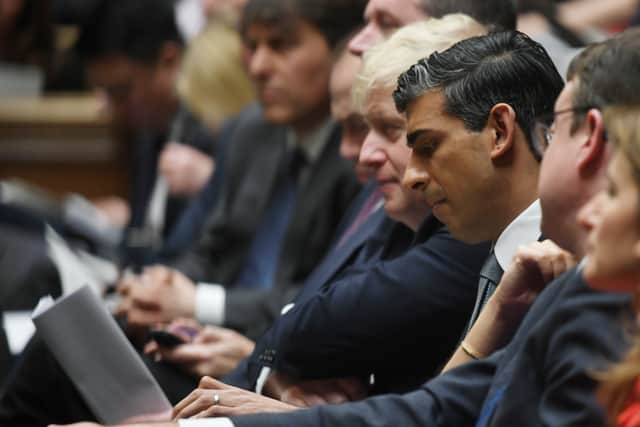Spring Statement 2022: Chancellor Rishi Sunak’s measures will leave the poorest in the UK paying a dear price
This article contains affiliate links. We may earn a small commission on items purchased through this article, but that does not affect our editorial judgement.
and live on Freeview channel 276
Rishi Sunak ended his Spring Statement this week with a triumphant flourish and to roars from his back benches. The mood now will be significantly more sombre as the country reels at the callous way in which the plights of millions were dismissed.
Despite ample headroom to act, the Chancellor chose to do effectively nothing to help those families on the lowest incomes.
Sunak needed something big on Wednesday.
Advertisement
Hide AdAdvertisement
Hide AdThe Office for Budget Responsibility confirmed that the UK will have to wait more than 18 years for real earnings (after the effects of inflation) to return to their 2008 level. It is an indictment of any government’s economic management at the best of times. But when it precedes the worst cost of living crisis in a generation, it is down right dangerous.
The measures Sunak did offer, principally an increase to the national insurance (NI) payment threshold, a 5p fuel duty cut, and future promise of a 1p income tax cut are good for one thing. That is to ensure that the large majority of the government’s giveaways accrue to the already well-off, and those least in need of help.


Chief economist at the New Economics Foundation (NEF), Alfie Stirling, likened the use of tax cuts to support households through crisis to pouring a bucket of water over someone who is thirsty - most of it misses the target, and lands up somewhere decidedly unhelpful.
The optics of the NI threshold increase are odd, with Sunak having recently increased the NI rate, this move just gave back a large chunk of the money that was, supposedly, previously earmarked for the NHS and social care.
Advertisement
Hide AdAdvertisement
Hide AdBut, what is also critical to recognise, is that the threshold rise offers no relief whatsoever to households who earn less than the existing threshold.
There is also minimal relief to those who earn just over the threshold as these households will also be in receipt of benefits, and will receive a concurrent reduction in their benefit payments. For example those on universal credit will see 55p wiped out for every £1 gained from the higher NI threshold.
Combine the NI changes with the minimal (and also highly unequally distributed) fuel duty cut, and the net result is that households in the poorest 10% gain less than £100 per year. This increase is wiped out by other losses.
Missing from the Spring Statement was any move to uprate benefits in line with inflation. The planned 3.1% increase will be dwarfed by the expected 8% inflation rate, overall, leaving the poorest households around £500 worse off.
Advertisement
Hide AdAdvertisement
Hide AdThis compounds an already precarious situation of costly heating bills, low pay, insecure work, and inadequate basic benefits levels. NEF estimates that 23.5 million people in the UK will be having to make sacrifices on essential items.
The statement came with just two silver linings. An allocation of £500m was added to the household support fund, affording local authorities the ability to distribute some more small emergency payments.
However, once split between some 118 authorities, the pot will be far too small to make a dent in the cost of living crisis.
Another positive was the decision to cut VAT on home energy efficiency products and services. This has been called for by many campaign groups across the UK and will help support the scale up of a national home retrofit programme tackling both the climate crisis and Britain’s vulnerability to the global gas market.
Advertisement
Hide AdAdvertisement
Hide AdThe measure, however, remains inadequate given both the scale of the climate crisis, the heating bill spike, and the urgent need to cut our dependence on Russian gas exports.
There is no inevitability to the oft-repeated trend of rising inequality through periods of crisis. Tools were there at the Chancellor’s disposal to cushion the impact to living standards in the UK and prevent a surge in poverty.
Sunak actively chose to cut taxes disproportionately benefiting the rich, when he could have easily chosen to target support at low- and middle-income families.
With the size of the UK’s net debt interest payments remaining near record lows, borrowing was also an option. Even a Chancellor averse to borrowing had low-hanging fruit available in the form of windfall taxes on oil and gas producers and wealth taxes. Suring up, and expanding the UK’s inadequate social security system should have been first on the agenda, beyond that, urgent action is needed to scale up the greening of the UK economy and unlock the cascade of new green jobs that will bring.
Advertisement
Hide AdAdvertisement
Hide AdInstead, the chancellor used this statement to play political games and flirt for the affections of the Tory backbenchers, presumably ahead of a future leadership challenge. Unless the Chancellor returns immediately to the dispatch box and puts things right, the poorest in the UK will pay a dear price.
A message from the editor:
Thank you for reading. NationalWorld is a new national news brand, produced by a team of journalists, editors, video producers and designers who live and work across the UK. Find out more about who’s who in the team, and our editorial values. We want to start a community among our readers, so please follow us on Facebook, Twitter and Instagram, and keep the conversation going.
Comment Guidelines
National World encourages reader discussion on our stories. User feedback, insights and back-and-forth exchanges add a rich layer of context to reporting. Please review our Community Guidelines before commenting.
